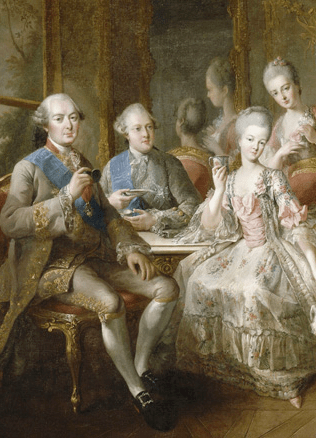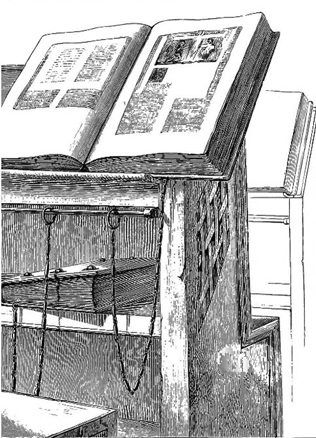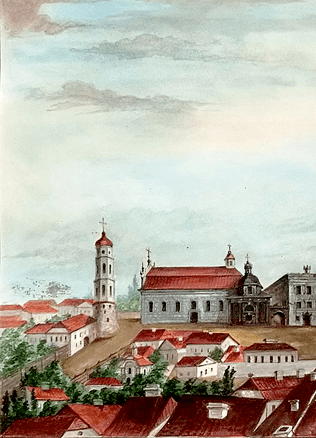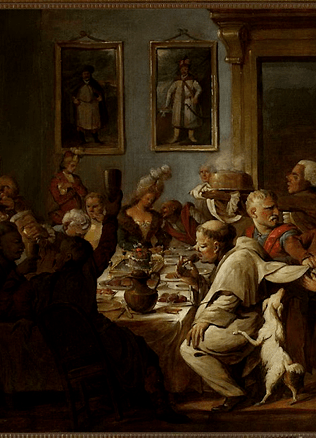The People without Noses
In the heat of the reforms proposed by the Four-Year Sejm and amid the growing tensions between part of the nobility and burghers due to the opposition of the formers against the new liberties that the town dwellers had recently gained, Bartolomej Muchlinski, a resident of Vilnius, received a letter from Žiežmariai. The letter described in a funny way the town festival that took place on the 27th and 28th of February 1792. The anecdote-like story drew attention of the officials in Vilnius as well. Muchlinski showed the letter to Jakob Sidorowicz, the scribe of the Vilnius Magistrate, who considered it “a peculiar occurrence” and entered a record about it in the Vilnius Municipal Record book. The Vilnius Magistrate was concerned about the events in Žiežmariai because the town belonged to the district of Vilnius which and the officials of the local government had to take care about it.
A story with elements of cannibalism
The letter from Žiežmariai was first published by the Szubrawcy Society (szubrawcy stands for rascals in Polish) in the Vilnius-based newspaper, the Street News (Wiadomości Brukowe). Władysław Syrokomla, the Polish-Lithuanian writer, later retold the story in his book Trips from Vilnius around Lithuania, in the chapter dedicated to the town of Žiežmariai. The story was quite well known throughout the country because it had been translated to Lithuanian. Syrokomla adjusted the story about Žiežmariai to his readers. He changed the title of the focal character from advocatus to burgomaster because the title of advocatus had been scrapped by the tsarist administration.
The letter received by Muchlinski reveals that the advocatus was back in Žiežmariai on the 27th of February 1792 after spending several months in Warsaw. He brought a privilege with him and, together with the magistrate and the town’s community, took part in a church service where he thanked God for the gift with cannon fire and the sounds of Te Deum in the background. After the service, the advocatus went to the nobility’s sejm where ordered the privilege to the town to be read aloud and invited everybody to his home. The party lasted for a couple of days. On the second day of the celebration (February 28th), a steward from the manor of Strėvininkai arrived to see the advocatus. In the heat of the party, the steward hit the advocatus for fun but the latter responded seriously. The steward got extremely angry about the fact that the advocatus had punched him, so he waited for a favourable moment, rushed to the advocatus and bit his nose off after which he went back to Strėvininkai.
As the anecdote goes, the nose was bitten off completely leaving the face gaping and the doctor who was urgently called in could find nothing to sew back to the face because the steward of Strėvininkai had either swallowed it while running away or took it away with him. The story from Žiežmariai ends with a warning: “It looks like the burghers must be careful in the face of the nobility and must take care of their own noses because the nobility who are not allowed to shed their brothers’ blood nor to maim them in local sejms, have sharpened their teeth against the noses of the urban advocati. The night watchmen in Žiežmariai now shout, “Be careful with your nose” instead of “Be careful with fire” to warn about the danger. This kind of wariness will be useful in other cities as well, especially in the ones that host the local sejms. There is something the advocatus cannot comprehend: was it a coincidence that this had happened to the official of the magistrate in the town that has a right of self governance?”
Few favoured the unrest in towns
The description of the incident that has drawn considerable attention of publicists and historians calls for explanation. Other historical sources indicate that Józef Staszewski, the city-born official, was the advocatus in Žiežmariai. The privilege to the residents of Žiežmariai was passed on the 14th of February 1792. Taking into account the duration of the trip, one can see that the return of the advocatus and the celebration in the city could be related with the privilege. Similar celebrations took place in Ukmergė after the city had been granted its own privilege. In Ukmergė, just like in Žiežmariai, the city’s advocatus, Józef Kuczewski showed the privilege to the nobility gathered at the district courthouse and asked it to be inscribed in the Municipal Record book. He later took part in the church service before inviting all the nobility to a party at his house.
The celebrations involving the nobility and the residents of towns were meant to display the brotherly union of the two estates, which became a topic for discussions after the Constitution had been adopted on the 3rd of May 1791. The residents of Žiežmariai were particularly active in 1791 and 1792 when they elected their local government, completed a fair quality statistical report on the situation in the city before deadline, and filled in the forms sent by the Commission of Police. In line with the request of its residents, Žiežmariai was divided into two sections. All the buildings within the town were numbered in 1792.
The procedure of acquiring the privilege for Žiežmariai was a long one. The town’s residents rested their arguments on the Law on Cities of 18th April 1791, which provided for granting privileges to all cities that host local sejms. After delivering their request to the Chancellery of the Grand Duchy of Lithuania, the town’s delegates had to wait for three months in Warsaw. They complained that the trustees of the administrator of Žiežmariai, Józef Poniatowski, delayed the process intentionally. Joachim Chreptowicz, the Deputy Chancellor of the Grand Duchy of Lithuania, did not want to issue the privilege either. The reluctance to issue the privilege on self-governance was apparently caused by the refusal of the residents of Žiežmariai to continue exercising their duties and paying taxes to the administrators of the district as the residents wanted to make use of their rights and freedoms embedded in the aforementioned Law on Cities.
Is self-governance not the burgher’s business?
Referring to the anecdotal story from Žiežmariai historians usually allege, quite justly, that the celebrations could well involve the fight between the town residents and the nobility. Despite that, it is pretty accurate to guess that tensions between the town residents and the administrators of the possessions of Józef Poniatowski were much higher than those between the town residents and the nobility. It is worth underlining that the conflict arose between the advocatus and the steward, as the letter says. Most probably, the episode with the nose bitten off is a flight of fancy, but we have no reason to think that the rest is fiction as well. On the other hand, every anecdotal situation has certain truthful background. What then does the bitten off nose of the advocatus symbolise?
The incident has a lot in common with the story of the main character in “The Nose” by Nikolai Gogol. However, honour and dignity of the advocatus, as the official of the city, apparently is not the main problem in the letter from Žiežmariai.
Mutineers was the term used by the wealthiest landlords to name the new officials of small towns who would dare to disobey their administrators’ orders, refuse paying taxes and exercising their duties against the landowners.
The same rhetoric was adopted by the Sejm where a number of discussions took place about “the wrong interpretation of the Law on Cities” and “the riots in towns” during the years of the great reforms. It is no wonder that the strenuous advocatus of Žiežmariai Józef Staszewski was a mutineer in the eyes of Józef Poniatowski and the administrators of his possessions. To substantiate the latter assumption, I will provide an quote from the report on the situation in the wake of a riot, sometimes also called an uprising, in the economy of Šiauliai written by Ludwig Kreiz in 1769: “During such a short time of visit I have never seen before in my life such a great number of the incapacitated and people without noses.”
Literature: Sirokomlė V., Iškylos iš Vilniaus po Lietuvą, Vilnius, 1989, p. 153–154 (vertė K. Umbražiūnas).
Liudas Glemža



